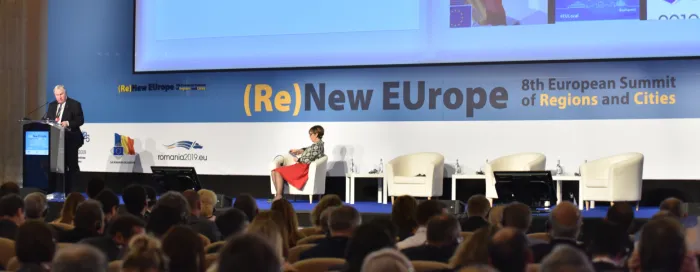Europe's future is at stake. As the continent faces increasing challenges, from climate change to growing inequalities, from globalisation to demographic change, all levels of government, including the local and regional levels, have a responsibility to work together. The European Union must overhaul the way it works, giving a greater say to its regions and cities, if it wants to renew the European project together with its citizens and respond to their social and economic needs.
This was the spirit of the declaration adopted by the European Committee of the Regions at its 8th European Summit of Regions and Cities, which took place in Bucharest on 14-15 March.
The members of the PES Group in the European Committee of the Regions, who actively contributed to elaboration of the declaration, believe that Europe's future needs to be focused around two key priorities: democratic participation and sustainable development. Indeed, effective multi-level governance, based on greater involvement of citizens, is much needed to strengthen democracy at a time when populist and far-right forces are growing in Europe. At the same time, mainstreaming sustainable development into all EU policies, first and foremost cohesion policy, is necessary in order to tackle persistent and growing inequalities in our societies and territories.
10 points to (Re)new Europe! Local & regional leaders across the #EU have just released the #Bucharest Declaration See how your representatives want to shape the #FutureofEurope #EULocal #RoadtoSibiu
— CoR (@EU_CoR) March 15, 2019
Intervening during the opening of the Summit, Catiuscia Marini, President of the PES Group and President of Umbria Region (Italy), said: "We cannot dissociate the fight against climate change from the fight for more social cohesion and integration. My plea is to not address social cohesion as a stand-alone topic. A new social ambition for Europe is to become part of a deeper fundamental change towards sustainable equality."
"The European governance and in particular the European Semester process need to become more ambitious, more binding and more territory-sensitive in relation to the implementation for the social Sustainable Development Goals and the follow-up to the European Pillar of Social Rights," she added.
Intervening in a panel debate on the subject of sustainable development, PES Group members added:
“We need to address not only the economic issues but also the social issues in the transition towards a sustainable Europe. Having a leadership at EU level is crucial for this! EU is a success story, we need to be able to defend the good things it does!”
— PES Group Committee of the Regions (@PES_CoR) March 14, 2019
Vasco Cordeiro #EULocal pic.twitter.com/1wYu3aZB02
“#SDG implementation is also an issue of deficient top-down tools. It can’t be that we still plan and redistribute based on GDP indicators only”
— PES Group Committee of the Regions (@PES_CoR) March 14, 2019
—@malmostad former mayor & @EU_CoR member Ilmar Reepalu at #EULocal pic.twitter.com/1d2aW1SE59
Peter Kurz, Mayor of #Mannheim: sustainable development goals #SDG are not just about climate change policy but encompass social issues related to energy poverty & transport as shown by yellow jackets movement. Thus need for integrated & participative approaches #EUlocal pic.twitter.com/nU9jD7377z
— PES Group Committee of the Regions (@PES_CoR) March 14, 2019
Their messages were also echoed by Olga Algayerova, Executive Secretary of the Economic Commission for Europe of the United Nations:
“The @UN Agenda 2030 for sustainable development is ambitious and we need to work together. This depends on the important contribution of cities and regions. I’m pleased to see your commitment to build a #SustainableEurope.”
— PES Group Committee of the Regions (@PES_CoR) March 14, 2019
—@algayerova at #EULocal pic.twitter.com/fQhUZQocrg
“Affordable housing, climate change, energy efficiency: all these challenges can be faced only if we have a comprehensive approach that includes cities and regions.”
— PES Group Committee of the Regions (@PES_CoR) March 14, 2019
Achieving #SDGs is the way forward!
—@algayerova#EULocal #LocalisingSDGs pic.twitter.com/Qtl3NO7YxJ
Karl-Heinz Lambertz, President of the European Committee of the Regions, said during the closing of the Summit: "The European Union needs its cities and regions just as much as cities and regions need the European Union. Europe is about proximity and social progress. All levels of government need to work assuming their part of the responsibility for Europe in order for the EU to become more visible, effective, democratic and closer to citizens, leaving no one behind. Led by the fundamental EU values of cohesion, unity and solidarity, we need a new contract that empowers the most trusted levels of government - the one million local and regional leaders - to be the game changers of the EU. This also means sufficiently equipping them with the right financial means and giving them a greater say in EU decision-making."
To re-build trust, to reconnect with its citizens and to renew Europe, the #EU needs its over 1 million local & regional politicians. Only together with all levels of government can we deliver a sustainable, social and democratic Europe in our communities #EULocal pic.twitter.com/8D9CeVZ5BY
— Karl-Heinz Lambertz (@CoR_President) March 15, 2019
The Summit Declaration by local and regional leaders on "Building the EU from the ground up with our regions and cities" was formally handed over to the President of Romania, Klaus Iohannis, by the President of the European Committee of the Regions, Karl-Heinz Lambertz, and will be presented to the leaders of the European Union institutions and Heads of State and Government, gathering in Sibiu (Romania) on 9 May.
